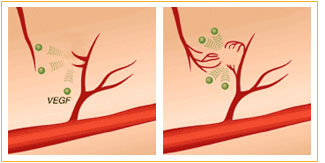AntiVEGF Treatment
AntiVEGF Treatment

What is VEGF?
VEGF is a short form for Vascular Endothelial Growth Factor, which is responsible for growth of blood vessels.
What is Anti-VEGF treatment?
The anti-VEGF agents block the VEGF molecules and thus benefit the patients by decreasing the abnormal harmful new blood vessels formation and by decreasing the leakage and swelling of the retina. This leads to stabilization of vision and even improvement in vision in many cases.
What are anti-VEGF agents?
As of now, there are three injections available with us for treatment. These are Avastin (bevacizumab), Lucentis (ranibizumab), and Eylea (aflibercept).
How do anti-VEGF agents apply?
These injections are given inside the eye. The procedure is a very small one, but is performed inside the sterile room to maintain the strict asepsis. Because there is 0.1% risk of developing serious infection in the eye (endophtalmitis), so every precaution is taken to avoid any infective risk. The patient is discharged within 10-15 minutes of the procedure, and can resume his/her normal activities immediately.
What retinal diseases can be treated with Anti-VEGF injections?
Intravitreal injection of anti-vascular endothelial growth factor (VEGF) agents is increasingly used for the treatment of a wide variety of retinal diseases, including age-related macular degeneration, diabetic retinopathy and retinal vascular occlusions, and retinopathy of prematurity.
What are the complications of anti-VEGF agents?
Endophthalmitis remains one of the most devastating complications of intravitreal injections. The second complication that is sometimes seen is high pressure in the eye. But this is usually transient side effect. Cataract and retinal detachment may also be associated with anti-VEGF injection.














